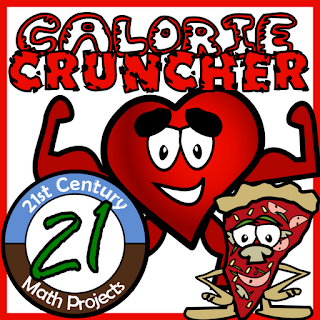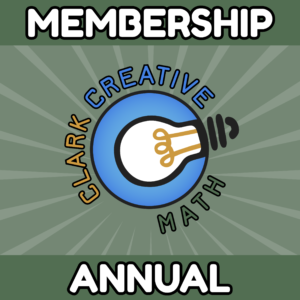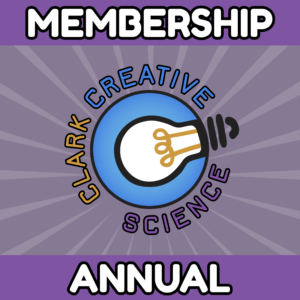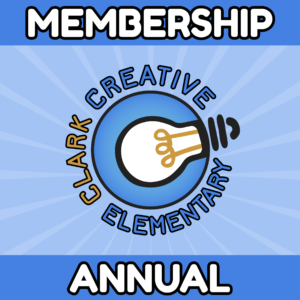Count the calories, make a fitness plan, watch weight, and practice linear inequalities in this fun and relevant 21st Century Math Project. Students will use authentic calorie data from common foods, popular fast food restaurants and also use calorie burning measurements for a variety of activities. In this middle or high school math project, students will look at meals and exercise in a completely different way as they help a cast of characters make dietary choices, plan meals and choose physical activities to remain fit.
Name: Calorie Cruncher
Suggested Grade Level: 7-12 (primarily Algebra 1 math skills)
Math Concepts: Creating and Solving Linear Inequalities
Interdisciplinary Connections: Nutrition, Exercise, Health, Physical Education
Teaching Duration: 3-5 Days (can be modified)
Cost: $5 for a 27 Page PDF (3 assignments, 1 project and Answer Key)
The Product: Using the data provided in the assignment, students will create diet plans and fitness regiments tailored to the needs for five celebrities – all with very different demands.
 |
| I didn’t know food gave you energy. |
As a math teacher, I am use to seeing a wide range of clueless looks. The “kinda-clueless”, the “not sure if I’m clueless-clueless”, the “how did I get to school today clueless”, and on and on… If you really want to get some clueless looks visit the cafeteria and ask questions about their lunch. They can answer “What are you eating?” with great accuracy, but if you follow that up with “What are you really eating?” You get your first clueless look. Someone is bound to remember that the ingredients are on the label. May start to list them. Then you follow that up with a “What is bioforestationoxidefructoseacetaminefine? ( or whatever long scientific ingredient that you feel like pronouncing). Not to pick on students, you’d get the same clueless look from adults. Heck, you’d get the same clueless look from me.
 |
| I hope McDonald’s is in the common core. |
Again, as is the case with most 21st Century Math Project the challenge is choosing, appropriate and rigorous math content. When thinking about developing a project around this, I conceptualized it the same way one would think of a budget assignment. Money made, money spent. This thinking led me to developing this with inequalities. To build different skills relevant to inequalities I developed assignments where students are analyzing the choices of others, and then allow them the freedom to make choices themselves.
Although this could be a middle or high school math project (depending on the level of your students), I have grabbed a few appropriate common core standards from High School Algebra
– — Solve linear equations and inequalities in one variable, including equations with coefficients represented by letters.
– — Create equations and inequalities in one variable and use them to solve problems.
– — Represent constraints by equations or inequalities, and interpret solutions as viable or nonviable options in a modeling context.
 |
You know I’ve got this overhead slide
with three types of inequality problems.
It’s kinda dingy, I’ll clean it and get it
over to ya. |
The final project, creating diet and fitness plans for celebrities is an abstract application that needs some scaffolding. Thus I have included three assignments leading up to it that will help understand the task.
“Fast Food Calorie Count” – Using menus of Fast Food restaurants, students will help five people write inequalities to determine if their lunch is within their daily caloric limit, but the catch is they only eat a steady diet of fast food.
In this assignment, students will understand how many calories people consume and how it rarely fits into a plan that is watching their diet.
“Fitness Guru” – Using data of physical activity, students help five people write inequalities to determine if they will burn enough calories to reach their personal fitness goals.
In this assignment, students will see how much work it takes to burn calories. Most people operate under a misconception of how much exercise they need to maintain weight.
“Weight Watchers” – Using both sets of data, students will help five people write inequalities to determine if they will burn enough calories to reach their weight loss or weight gain goals.
In this assignment, students try to find the balance between diet and exercise to hit goals.
Certainly weight can be a touchy issue with young people on both ends of the spectrum. I’ve intentional written assignments and characters to subliminally go against stereotypes and keep the task focused on the math.
EXTENSION: An easy extension would be for students to keep their own food journal and exercise log over a course of a week.






